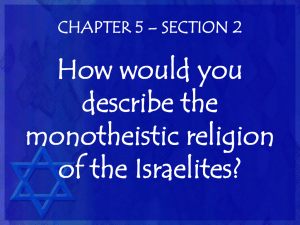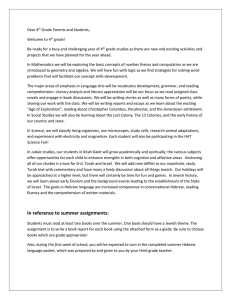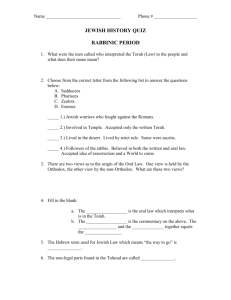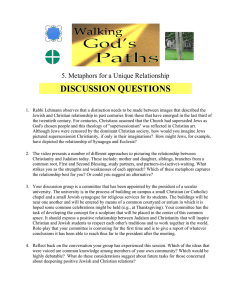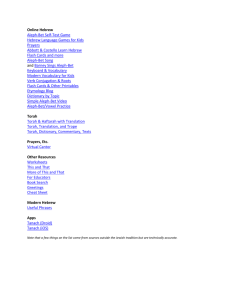Glossary Actualization
advertisement
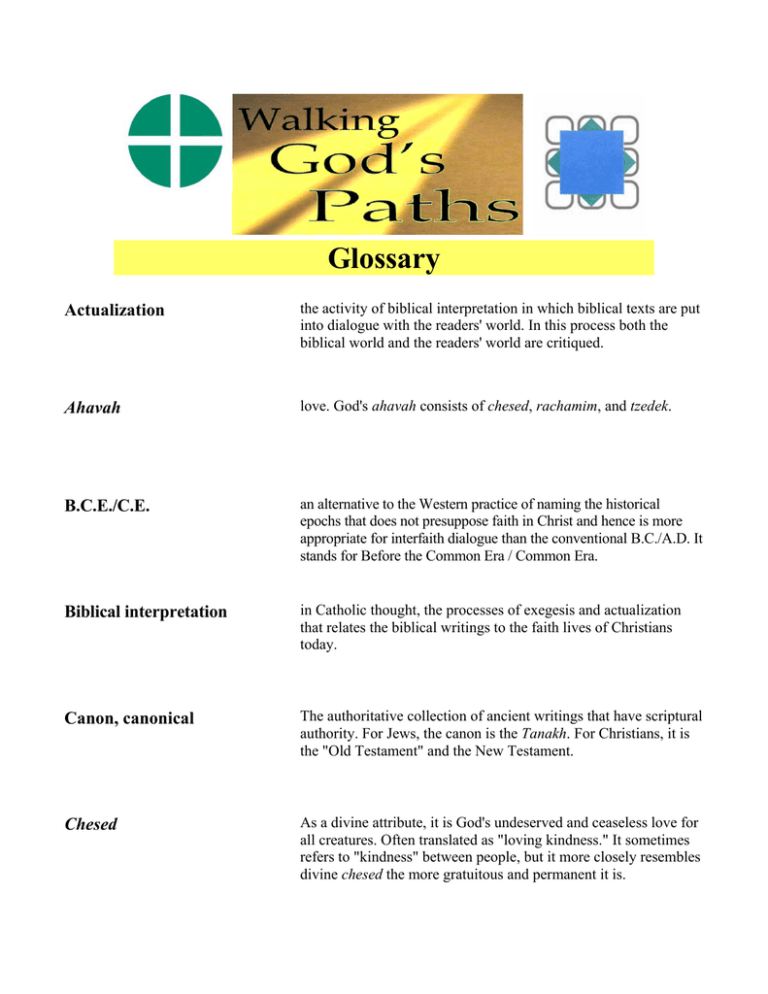
Glossary Actualization the activity of biblical interpretation in which biblical texts are put into dialogue with the readers' world. In this process both the biblical world and the readers' world are critiqued. Ahavah love. God's ahavah consists of chesed, rachamim, and tzedek. B.C.E./C.E. an alternative to the Western practice of naming the historical epochs that does not presuppose faith in Christ and hence is more appropriate for interfaith dialogue than the conventional B.C./A.D. It stands for Before the Common Era / Common Era. Biblical interpretation in Catholic thought, the processes of exegesis and actualization that relates the biblical writings to the faith lives of Christians today. Canon, canonical The authoritative collection of ancient writings that have scriptural authority. For Jews, the canon is the Tanakh. For Christians, it is the "Old Testament" and the New Testament. Chesed As a divine attribute, it is God's undeserved and ceaseless love for all creatures. Often translated as "loving kindness." It sometimes refers to "kindness" between people, but it more closely resembles divine chesed the more gratuitous and permanent it is. Christ the Greek form of the Hebrew word mashiach or messiah and literally means an “anointed one”. The Hebrew and Greek forms no longer have identical meanings. For Christians, Jesus Christ is the one whom God anointed as the inaugurator of God’s Reign, but whose messianic tasks will not be completed until his return in glory when the Reign will be established in all its fullness. Covenant from the Hebrew word, b’rit, is an agreement between parties, especially that between God and Israel, or later, between God and the Church through Jesus Christ. In these religious senses, covenant is more than just a contractual agreement. It is a sharing in life together with mutual duties and obligations. Deicide literally, the murder of God, it is a charge repeated by Christian preachers over the centuries. "The Jews" had committed this crime by crucifying Jesus and as a result were cursed by God. The concept was repudiated by the Second Vatican Council declaration, Nostra Aetate. Ecumenical the movement toward collaboration and unity among the diverse Christian communities. Eschaton the future time when the present age gives way to the Kingdom of God or the Age to Come. Study and reflection about it is called eschatology. Exegesis the activity of biblical interpretation which uses various historical and literary tools to study the world that produced a biblical text and the inner dynamics of the text itself. Gospel, Gospels (= good news) broadly it refers to the Christian "good news" about Jesus Christ. More specifically it refers to the four New Testament books of Matthew, Mark, Luke, and John that narrate distinct stories of the life, death, and resurrection of Jesus. Haggadah (or Aggadah) non-legal materials in rabbinic and subsequent Jewish literature, such as sermons, ethical and moral instruction, discussions or speculations about God, and folklore. Halakhah (= "going," "walking") legal material and debates in rabbinic and subsequent Jewish literature. Its Greek cognate is hodos. In Jewish thought, the halakhah teaches Jews how to respond to God's ahavah by observing the mitzvot (commands) and thereby to be counted as tzedek. Kingdom of God or Reign of God is the metaphor used by Jesus to speak of the Age to Come or New Creation. Conceptually rooted in the Hebrew Torah and prophetic tradition, it refers to the inevitable destiny of all of created existence to conform to God’s will. Then the lion will lie down with the lamb, the swords will be beaten into plowshares, universal shalom and justice will prevail, and all people will acknowledge the Lordship of the One God. Midrash the exposition and interpretation of the Bible by the rabbis, dealing with both legal and ethical-moral matters, ultimately collected in volumes of Midrash (plural, Midrashim). Mishnah this "oral teaching" was compiled and edited by the rabbis around 200 c.e. Understood as the first written expression of the "oral law," it is a collection of laws and ethics organized in six sections or "orders." Mitzvot God's commands as contained in the Torah. New Testament The second part of the Christian Bible. Its 27 books all date from the first and early second centuries c.e. and give witness to the life, death, and resurrection of Jesus and the birth of the Church. "Old Testament" the first part of the Christian Bible, containing all of the books (though in different order) found in the Jewish Tanakh. Following the example of the Septuagint, Roman Catholic and Eastern Orthodox Bibles contain additional books. [Since "old" can suggest an obsolescence that is offensive to some Jews and that conflicts with the current theological understanding of many Christian churches, a number of alternative terms have been proposed. These include First Testament, Hebrew Scriptures, and Shared Testament. Since a consensus has not emerged, this User's Guide puts the phrase in quotation marks to acknowledge the question.] Pharisees from the Hebrew for "separated ones," this way of being Jewish seems to have arisen around the second century b.c.e. Since the Pharisees did not hold to one monolithic set of beliefs and few of their own writings have survived, it is difficult to describe their perspectives. It seems fair to characterize them as seeking to make all Jewish life as holy as if one were praying in the Temple through certain traditions about Torah observance. Thus, they seemed to practice ritual purity at their fellowship meals wherever they occurred. Judging by references to them from other groups of Jews, they also seem (with some variations among various Pharisaic subgroups) to have creatively interpreted the Torah in the context of their contemporary circumstances. Some have suggested that their interest in extending Temple holiness to places physically distant from it prepared them to cope better with its destruction in 70 c.e. Thus many consider them to be the forebears of the rabbis. The Christian gospels tend to portray the Pharisees polemically, probably because baptized Jews competed unsuccessfully with Pharisees for influence in the post-Temple Jewish world. Rabbinic Judaism the form of Judaism that became normative several centuries after the destruction of the Second Temple. The rabbis interpreted and debated the meaning of Israel's scriptures by means of an "oral law" that achieved written form in the Talmud. Rabbinic Judaism stresses the need for prayer, the performance of God's commands, and study of the Torah. Rachamim the divine characteristic of mercy (but related to rechem =womb, and so motherly, nurturing compassion). In terms of making moral judgments, this divine virtue tips the balance, since God's justice is always merciful. Resurrection In Judaism, the Pharisaic concept that the righteous dead will have a share in the Kingdom of God. The term was applied in Christianity to God's act of raising the crucified Jesus to transcendent glory. Sadducees this term for a particular way of being Jewish apparently arose in the second century b.c.e. Its probable connection with the name Zadok (David's high priest) suggests that they were associated with the priestly aristocracy in Jerusalem, although this linkage is questioned by some. Seder (= "order") the solemn and joyous ritual Passover meal in which the liberation of the Hebrews from slavery in Egypt comes alive by means of symbolic foods, prayers, songs, and the interactive telling of the exodus story. Septuagint A Greek translation of the Hebrew and Aramaic books of ancient Israel's scriptures done by seventy Jewish scholars in Alexandria around 200 b.c.e. It is the version of scriptures quoted by the writers of the New Testament. Biblical discoveries among the Qumran (Dead Sea) scrolls attest to a Hebrew textual tradition of the Bible that likely lay behind the Septuagint. Supersessionism the Christian theological claim that the Church had replaced or superseded Jews as God's chosen people. It is largely premised on the presumptions that Jews were collectively punished for their alleged rejection and crucifixion of Jesus. The Second Vatican Council declaration, Nostra Aetate, affirmed that Jews remain in covenant with God and stated that the New Testament does not teach that Jews were somehow cursed by God. The Council thus negated the foundational premises of supersessionism. Talmud (= "study") consists of the Mishnah and the Gemara, the rabbinic debates on the Mishnah. There are actually two Talmuds: the Yerushalmi, or the Talmud of the Land of Israel, probably edited in the Galilee around 300-400 C.E., and the Babylonian Talmud or Bavli, composed in Babylon around 500-600 C.E.. Both discussed the Mishnah and its scriptural basis in the Torah, but the Bavli joined Torah and Mishnah together more thoroughly and was more expansive. Jews for centuries have, therefore, approached the Written Law, the Torah, by way of the written Oral Law, and most especially through the Bavli. Tanakh the Jewish name for Israel's sacred scriptures, it is an acronym for the Hebrew divisions of Teachings (Torah), Prophets (Nevi’im), and Writings (Ketuvim). Teaching of Contempt a phrase coined by the French historian Jules Isaac to describe negative Christian teaching about Jews and Judaism that persisted from the second and third centuries c.e. up to the twentieth century. It asserted that because of the crucifixion of Jesus, God's blessings had been transferred from the Jewish people to the Church. Jews were doomed to wander the earth without a homeland and should be marginalized in Christian society. Jews followed a religion dominated by the rabbis that became obsolete after the coming of Christ. The phrase is roughly synonymous with the theology of supersessionism. Temple the house of the Lord in Jerusalem, where ritual animal sacrifices to God were carried out. The First Temple was built by Solomon around 950 b.c.e., but was destroyed by the Babylonians in 586 b.c.e. A more modest Second Temple began to be reconstructed several decades later when Judean aristocrats returned from exile in Babylon. Herod the Great, the Roman-appointed "King of the Jews," brought the temple to its greatest magnificence in a massive building project that began in 20 b.c.e. and lasted for years after Herod's death, reaching completion only shortly before its destruction by the Romans in 70 c.e. The modern use of the word "temple" for "synagogue" in the Reform movement of Judaism, should not be confused with the singular Temple of Jerusalem. Tikkun Haolam, tikkun olam a Hebrew expression that means “mending the world.” It relates to the covenantal obligation to be partners with God in bringing Creation to its divinely-intended completion. Torah best translated as "teaching," this Hebrew term has broader and narrower senses. Most precisely, it refers to the first five books in the Bible, the "Books of Moses" -- Genesis, Exodus, Leviticus, Numbers, and Deuteronomy. For Jews, these books enjoy the highest authority. Torah is sometimes used in a broader sense to refer to the entire Jewish Bible, the Tanakh. In its broadest sense, Torah includes both the Oral and Written traditions of the Bible and the rabbinic Talmud. In classical times, Greek-speaking Jews translated Torah as nomos or "law," which became the standard Christian usage. This rendering is unfortunate because it risks caricaturing the Torah and its study as legalistic. Triduum The three day liturgical observance of Jesus' Last Supper, crucifixion, and resurrection on the days known by Catholics as Holy Thursday, Good Friday, and Easter (especially the Easter Vigil). Trinity the Christian understanding that God is intrinsically relational, even in God’s own being. God is Source, Creator, Sustainer, or Father of all that exists; who eternally generates the Revealing Word, Wisdom, or Son through whom all things are made and who constantly extends the invitation to divine relationship; and whose creative and irrepressible Spirit animates, inspires, and enables relationship with God. Christians also believe that God’s Word, God’s revealing self, was incarnate in Jesus of Nazareth, a firstcentury Galilean Jew. Tzedek righteousness, love that is owed; related to tzedakah = "charity," being just by being loving.
